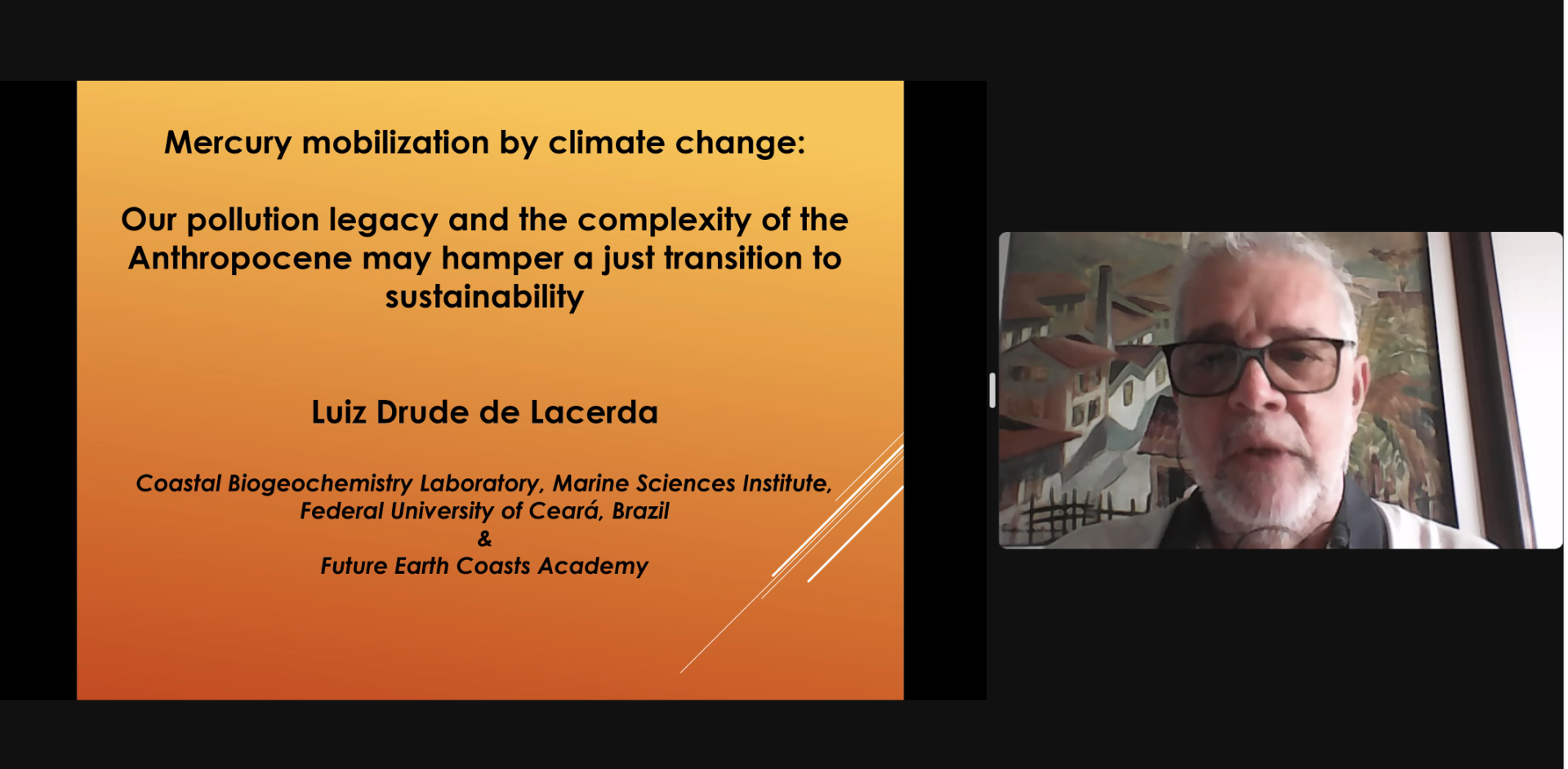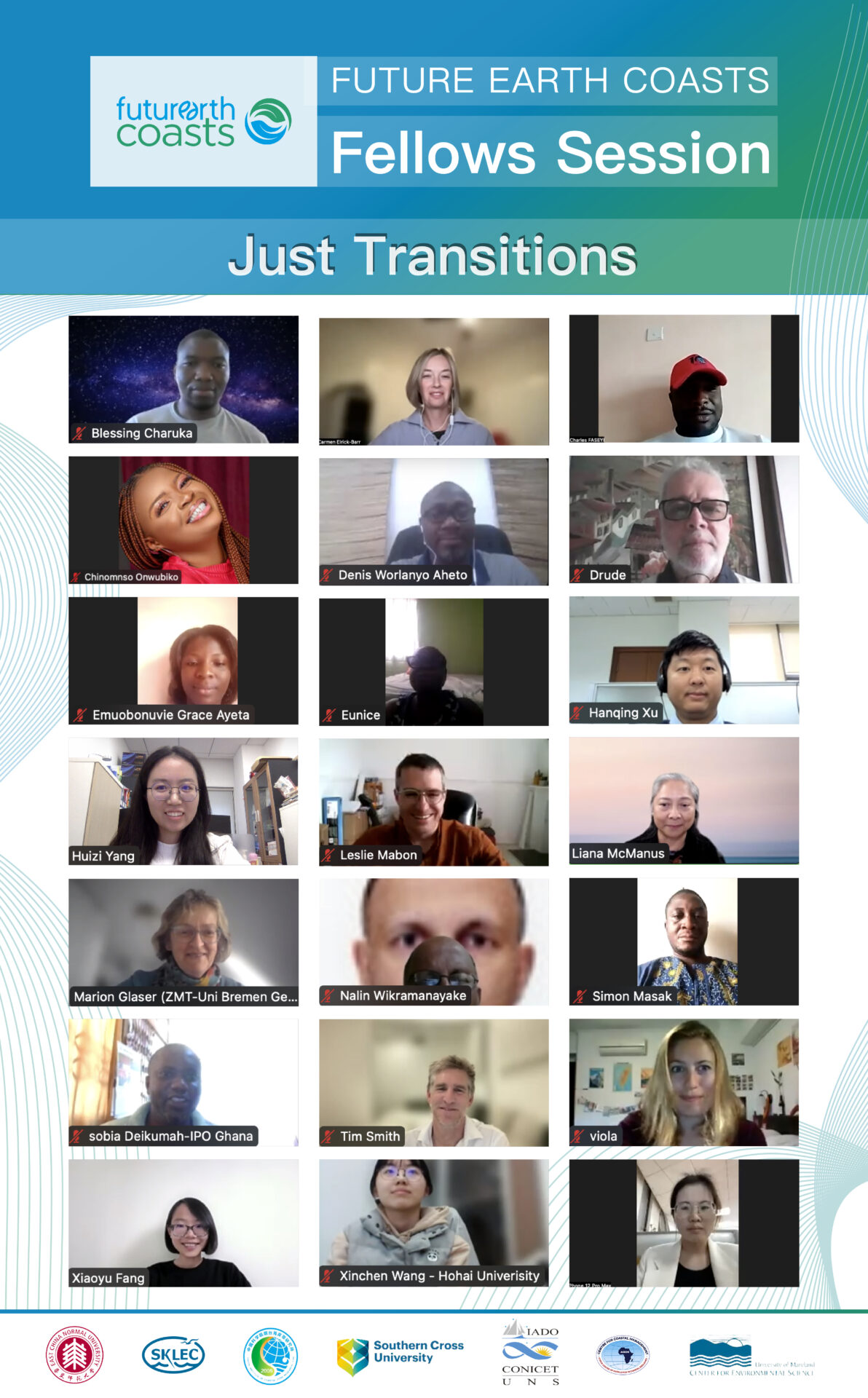Just transitions – the idea that our responses to climate change and sustainability challenges must not leave behind the people and places who rely on resource economies – are especially significant for coastal regions globally.
Future Earth Coasts have been working with strategic partners to enable stakeholders to identify and choose credible, relevant and legitimate coastal sustainability pathways for their region. The work include understanding barriers and enablers for transitioning to coastal sustainability, and identifying practical processes to identify and institutionalize transitions to alternative futures. The underlying aim is to understand how society, and its institutions, can be empowered to make decisions that resolve conflicting interests and turn coastal sustainability knowledge into practical action.
The FEC Fellows Session ‘Pathways to Coastal Sustainability: Just Transitions’ took place online on 24 April. This webinar focused on the FEC theme ‘Pathways to Sustainability’ that aims to identify plausible Pathways to coastal sustainability to avoid unwanted futures. The workshop gathered a panel of respectful, highly-anticipated FEC academy members to share their perspectives on the topic ‘Just Transitions’. In the workshop, participants looked at how different coastal regions globally are trying to create fair and decent work, and a sustainable economy, for people and places who have previously relied on high-emitting industries and also for people and places whose livelihoods depend on natural resources. It was moderated by FEC fellow Dr. Lesile Mabon and FEC academician Dr. Liana McManus. Prof. Tim Smith (Co-Chair of FEC), Prof. Denis Aheto and Prof. Luiz Drude de Lacerda presented their work in the webinar as guest speakers.

Professor Tim Smith reviewed some basic principles and outlined his perspective on what Just Transitions mean. There is a hierarchical relationship among the environment, society and economy. As he noted, ‘Without the environment we have no society and without society we have no economy, and none of this is reflected in any of the discourses of just transition that we face.’ Through his many case studies around Australia, he argued that there are many communities and economies that are already being devastated by the effects of climate change. Coastal disasters, growing inequalities, rising costs of living …… These are issues that coastal communities in Australia are currently facing.

Prof. Dr. Denis Worlanyo Aheto shared three aspects: (1) the Just Transition and nexus of sustainability, (2) the West African case study, and (3) the ACECoR approach. Based on sustainability, they are looking at how the benefits that accrue from the environment can be optimized. He mentioned that budgets are in demand, so the second issue has to do with the fact that interventions are very costly, especially way harder solutions. The third issue, working in investing also has to do with the fact that the size of it in providing technical solutions and science, which makes things even more complex.

Dr. Liana Talaue McManus explored the nature and challenges of adjusting to transition for coastal livelihoods. She got this framework from the movement generation for a just transition. The centerpiece elements are resources plus work towards a purpose. This framework applies to coastal livelihoods as well. However, she highlighted that there are unique things about coastal livelihoods. Firstly, it accumulates pressure from land to sea or downstream direction, as such human activities cause changes in land use, the flow of pollutants and extraction of resources. The other unique element is that there is a multiplicity of property regimes that define access and use of resources from those that are based on exclusive use. The framework that she used in this particular project addresses three foundational elements: community mobilization, building CRM (local coastal resource management) institutions and fortified environmental education that builds on traditional local knowledge.

Later on in the session, Professor Luiz Drude de Lacerda spoke about the impact of climate change on mercury: Our legacy of pollution and the complexity of the ‘Anthropocene’ could hinder a just transition to sustainability. Mercury is the only element in the entire periodic table that causes damage to humans through environmental exposure and it is a global pollution. And another issue is the impact of contaminants on food sources.

In the wrap-up notes, Dr Lesile Mabon emphasized that just transition means developing realistic and feasible pathways to a more sustainable and low-carbon economy and society for carbon-intensive regions and recognizing reliance on industry for jobs and revenue. Coastal societies have significant potential as sites for climate change mitigation through renewable energy, carbon sequestration, etc. Yet coastal societies also rely heavily on natural resources for jobs and the local economy. The vital of ‘Just Transitions’ is that developments happen in the interest of the communities nearest to them and bring jobs and innovation to coastal societies.
Watch the video recording through FEC YouTube Channel:

